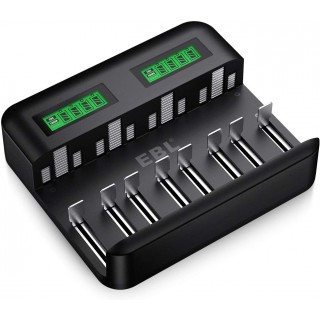Battery chargers are essential for powering devices in various IT hardware setups. As Technology continues to evolve, the demand for efficient charging solutions has grown significantly. Understanding how battery chargers function, their types, and their importance in the world of IT hardware can help businesses and individuals make informed decisions. In this post, we’ll dive into the different types of battery chargers, their benefits, and considerations for choosing the right one for your specific needs.
What Are Battery Chargers?
Battery chargers are devices that transfer electrical energy into a rechargeable battery by forcing an electric current through it. The primary purpose is to replenish the energy that a battery loses during use, enabling it to power devices again. These chargers are fundamental for maintaining the operational efficiency of various electronic devices, including IT hardware, portable gadgets, and other equipment.
Importance of Battery Chargers in IT Hardware
In the realm of IT hardware, battery chargers play a crucial role in ensuring that devices operate without interruptions. Whether it’s a server that relies on a backup power supply, a laptop, or other essential computer accessories, a reliable battery charger is indispensable. Here’s why they are particularly significant:
- Uninterrupted Power Supply: Battery Chargers help maintain a continuous power flow, especially in environments where constant uptime is critical. This ensures that devices like laptops, wireless routers, and backup storage systems remain operational during power outages.
- Increased Device Lifespan: Using the correct battery charger for your devices can help extend the lifespan of the batteries. Proper charging prevents overcharging and overheating, which are common causes of battery degradation.
- Energy Efficiency: Modern battery chargers are designed to be energy-efficient, reducing power consumption and costs for businesses and individuals. These chargers can automatically stop drawing power once the battery is fully charged, minimizing energy wastage.
Types of Battery Chargers
There are several types of battery chargers available, each designed for specific purposes. Understanding the differences can help users choose the right charger for their IT hardware needs:
- Trickle Chargers
- Purpose: Trickle chargers are designed to charge batteries slowly over an extended period. They are ideal for devices that are not used frequently but need to maintain a consistent charge.
- Use Case: Trickle chargers are often used for backup power systems, such as Uninterruptible Power Supplies (UPS) in IT hardware setups.
- Smart Chargers
- Purpose: These chargers are equipped with sensors and algorithms that monitor the battery’s condition and adjust the charging process accordingly. Smart chargers are known for preventing overcharging and overheating.
- Use Case: Smart chargers are suitable for laptops, smartphones, and other sensitive Computer Accessories that require precise charging conditions.
- Fast Chargers
- Purpose: As the name suggests, fast chargers are designed to charge batteries quickly, usually within a few hours. These chargers use higher voltage and current to speed up the charging process.
- Use Case: Fast chargers are often used in environments where time is critical, such as for IT hardware used in field operations.
- Solar Chargers
- Purpose: Solar chargers use solar panels to convert sunlight into electrical energy, which is then used to charge batteries. They are an eco-friendly option for maintaining device power.
- Use Case: Solar chargers are ideal for remote locations where access to conventional power sources may be limited.
- Inductive Chargers
- Purpose: Inductive or wireless chargers transfer energy through electromagnetic fields, allowing for a cordless charging experience.
- Use Case: These chargers are commonly used with modern smartphones and wearable devices but are increasingly being explored for other IT hardware applications.
How to Choose the Right Battery Charger
Selecting the right battery charger for your needs requires consideration of several factors. These include the type of battery, the device’s power requirements, and your specific use case. Here’s what to keep in mind:
- Battery Type Compatibility: Not all battery chargers are compatible with every battery type. Common types include lithium-ion, nickel-metal hydride (NiMH), and lead-acid batteries. Ensure that the charger matches the battery type of your device.
- Voltage and Current Ratings: Different devices have specific voltage and current requirements. Using a charger that does not match the required specifications can damage the battery or reduce its efficiency. Check the device’s manual for the recommended charger specifications.
- Smart Features: Modern chargers often come with smart features like auto-shutoff, temperature control, and trickle charging capabilities. These features help prevent overcharging, overheating, and other issues that can harm battery life.
- Portability: For users who travel frequently or work in remote areas, the portability of a battery charger can be a significant factor. Compact, lightweight chargers are more convenient for travel and outdoor use.
- Charging Speed: Depending on your use case, the speed of charging may be a critical consideration. Fast chargers can save time but may generate more heat, which can be a concern for delicate devices.
Benefits of Using the Right Battery Chargers
Investing in the right battery chargers for IT hardware and other electronic devices can bring numerous benefits. Here are some of the key advantages:
- Cost Savings: A good battery charger can help extend the lifespan of batteries, reducing the need for frequent replacements. This results in significant cost savings over time.
- Enhanced Safety: Using a charger that is compatible with your devices minimizes the risk of overheating, battery swelling, and other safety issues. This is particularly important in professional IT settings where safety is a priority.
- Environmental Benefits: High-quality chargers with energy-saving features reduce power consumption, contributing to a lower carbon footprint. Additionally, using rechargeable batteries helps cut down on single-use battery waste.
- Convenience: Modern chargers are designed for user convenience, with features like LED indicators, multiple ports, and compact designs. This makes managing multiple devices simpler, especially in tech-heavy environments.
Conclusion:
Battery chargers are more than just accessories—they are an integral part of maintaining the functionality and efficiency of IT hardware. From providing a reliable power source during outages to extending the lifespan of devices, battery chargers play a crucial role in both personal and professional settings. Understanding the different types of chargers and selecting the right one for your needs can make a significant difference in performance, safety, and cost-effectiveness.
As Technology continues to evolve, so does the need for smarter and more efficient charging solutions. Whether you’re a business looking to optimize your IT infrastructure or an individual seeking reliable power for your devices, choosing the right battery charger is key to maintaining productivity and reducing downtime. Invest in the right charger, and you’ll ensure that your IT hardware is always ready to perform when you need it most.
















